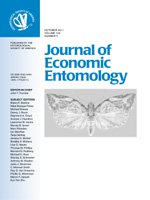The application of insecticides to control oriental fruit fly, Bactrocera dorsalis Hendel (Diptera: Tephritidae), is a principal component of the current management of these fruit flies. However, we evaluated four extracts Alpinia galanga Wild Linn (Zingiberaceae) rhizomes against adult flies and found hexane and ethanol extracts to be most effective (LC50 = 4,866 and 6,337 ppm, respectively, after 24 h). This suggested that both nonpolar and polar compounds could be active in the candidate plant. Accordingly, the hexane extract was further processed to isolate nonpolar active compounds from this plant source. Two compounds, (E)-p-acetoxycinnamyl alcohol and (E) -p-coumaryl alcohol ethyl ether, were identified as active ingredients and found to be more active than total hexane extract (LC50 = 3,654 and 4,044 ppm, respectively, after 24 h). The data suggested that the compounds were not synergistic but may have some additive effect in a mixture. The activity of the hexane extract against detoxification enzymes, carboxylesterase (CE) and glutathione transferase (GST) also was determined in vitro. CE was inhibited by 70%, whereas GST was not significantly inhibited. Insect CEs mediate insecticide resistance via their induction; therefore, inhibition of these enzymes by plant allelochemicals could be a useful alternative approach for the management of the pest in the field.
BioOne.org will be down briefly for maintenance on 17 December 2024 between 18:00-22:00 Pacific Time US. We apologize for any inconvenience.
How to translate text using browser tools
1 October 2011
Bioefficacy of Alpinia galanga (Zingiberaceae) Rhizome Extracts, (E) -p- Acetoxycinnamyl Alcohol, and (E) -p-Coumaryl Alcohol Ethyl Ether Against Bactrocera dorsalis (Diptera: Tephritidae) and the Impact on Detoxification Enzyme Activities
N. Sukhirun,
W. Pluempanupat,
V. Bullangpoti,
O. Koul
ACCESS THE FULL ARTICLE
It is not available for individual sale.
This article is only available to subscribers.
It is not available for individual sale.
It is not available for individual sale.

Journal of Economic Entomology
Vol. 104 • No. 5
October 2011
Vol. 104 • No. 5
October 2011
Alpinia galanga
Bactrocera dorsalis
carboxylesterase
glutathione transferase
toxicity




